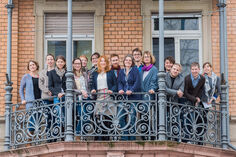Linguistic Inquiry and Word Count (LIWC)
Linguistic Inquiry and Word Count (LIWC, pronounced "Luke") is a computer program for dictionary-based, automatic quantitative text analysis, which was developed by Prof. Dr. James Pennebaker and colleagues at the University of Texas.
Originally developed with the goal of examining essays from expressive writing experiments, it is now one of the most widely used text analysis tools in the world. The LIWC is based on a simple word counting algorithm, by means of which individual words of a text are counted and assigned to defined word categories. When analyzing texts, it uses a comprehensive dictionary. The German version of the dictionary was developed in cooperation with the FOST. In addition to general linguistic features, the dictionary also captures psychological processes and content-related aspects (e.g., positive or negative emotions, cognitive processes, social processes). The LIWC has been used in numerous studies on social, personality, and clinical psychological research questions. It shows good psychometric properties and a broad coverage of natural, spoken, and written language. The dictionary has now been translated into several languages, enabling cross-linguistic and cross-cultural research. In cooperation with the research group of James Pennebaker, the LIWC 2001 dictionary was translated into German at the FOST and tested for its usefulness in the context of e-health. In addition to its comprehensive coverage of key language features, the strengths of LIWC lie in its cross-theoretical development context, ease of use, and performance. Using LIWC, large amounts of text can be evaluated quickly and reliably. This aspect is of great importance not only in the context of readily available and rapidly growing text corpora on the Internet.
The German LIWC is continuously being further developed. A translation of the 2015 dictionary is currently in preparation in cooperation with James Pennebaker and the University of Zurich.
The German dictionary is freely usable for scientific purposes and is available from the authors (markus.wolf(at)psychologie.uzh.ch).
Literature
Wolf, M., Horn, A., Mehl, M., Haug, S., Pennebaker, J. W. & Kordy, H. (2008). Computergestützte quantitative Textanalyse: Äquivalenz und Robustheit der deutschen Version des Linguistic Inquiry and Word Count. Diagnostica, 2, 85-98.



